November 2021 in “Frontiers in Genetics” The FAW-FS algorithm improves depression recognition, and psychological interventions help AGA patients' mental health.
 10 citations,
September 2020 in “Computational and Mathematical Methods in Medicine”
10 citations,
September 2020 in “Computational and Mathematical Methods in Medicine” Researchers developed an algorithm for self-diagnosing scalp conditions with high accuracy using smart device-attached microscopes.
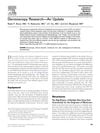 30 citations,
September 2009 in “Seminars in Cutaneous Medicine and Surgery”
30 citations,
September 2009 in “Seminars in Cutaneous Medicine and Surgery” Dermoscopy has greatly improved the diagnosis of skin lesions and our understanding of their morphology and biology.
 1 citations,
February 2024 in “npj digital medicine”
1 citations,
February 2024 in “npj digital medicine” Researchers improved a skin disease diagnosis model using online images, achieving up to 49.64% accuracy.
 18 citations,
January 2020 in “Frontiers in Chemistry”
18 citations,
January 2020 in “Frontiers in Chemistry” A new model can predict drug-disease links well, helping drug research.
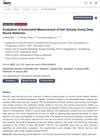 8 citations,
January 2022 in “Sensors”
8 citations,
January 2022 in “Sensors” Deep learning can accurately automate hair density measurement, with YOLOv4 performing best.
 4 citations,
October 2022 in “Journal of Imaging”
4 citations,
October 2022 in “Journal of Imaging” An intelligent system can classify hair follicles and measure hair loss severity with reasonable accuracy.
 1 citations,
July 2024 in “Skin Research and Technology”
1 citations,
July 2024 in “Skin Research and Technology” High-frequency ultrasound can effectively visualize and assess hair loss.
 1 citations,
March 2024 in “Skin research and technology”
1 citations,
March 2024 in “Skin research and technology” A new AI model diagnoses hair and scalp disorders with 92% accuracy, better than previous models.

GoogLeNet is the best model for identifying folliculitis.
2 citations,
July 2023 in “Animals” FGF10 and non-coding RNAs are important for cashmere goat hair follicle development.
1 citations,
July 2012 in “ACM transactions on graphics” The new algorithm accurately captures both facial hair and skin in 3D using a camera-based system.
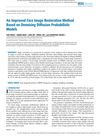 1 citations,
January 2024 in “IEEE access”
1 citations,
January 2024 in “IEEE access” The new method improves facial image restoration quality and face recognition accuracy.
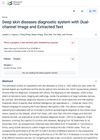 September 2022 in “Research Square (Research Square)”
September 2022 in “Research Square (Research Square)” The AI model DIET-AI effectively diagnoses skin diseases as well as doctors.
 May 2023 in “Indian journal of science and technology”
May 2023 in “Indian journal of science and technology” The new deep learning system can accurately recognize hair loss conditions with a 95.11% success rate.
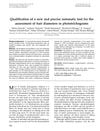 9 citations,
January 2011 in “Skin Research and Technology”
9 citations,
January 2011 in “Skin Research and Technology” The new automatic tool accurately measures hair thickness and is reliable.
 1 citations,
January 2023 in “Brazilian Journals Editora eBooks”
1 citations,
January 2023 in “Brazilian Journals Editora eBooks” Children's screen time increased during the pandemic, causing various health issues.
 10 citations,
July 2021 in “International Journal of Rheumatic Diseases”
10 citations,
July 2021 in “International Journal of Rheumatic Diseases” Lupus patients' body image issues significantly affect their mental health and need more support.
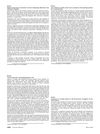 February 2024 in “Journal of the American Academy of Dermatology”
February 2024 in “Journal of the American Academy of Dermatology” Vascular patterns in dermoscopy help tell apart malignant and benign skin tumors.
 October 2023 in “Han'gug miyong haghoeji/Journal of the Korean society of cosmetology”
October 2023 in “Han'gug miyong haghoeji/Journal of the Korean society of cosmetology” Understanding psychological discomfort in hair loss can improve treatment outcomes.
 2 citations,
July 2020 in “Behavioural Brain Research”
2 citations,
July 2020 in “Behavioural Brain Research” Changing neuroactive steroids in baby male rats affects their memory and learning differently as they grow up.
 13 citations,
July 2019 in “Pediatric dermatology”
13 citations,
July 2019 in “Pediatric dermatology” Pediatric dermatologists need to understand the unique skin health needs of LGBTQIA youth to provide better care.
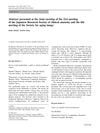 March 2018 in “Surgical and Radiologic Anatomy”
March 2018 in “Surgical and Radiologic Anatomy” High-resolution imaging is crucial for diagnosing and planning treatments in clinical anatomy and aging.
 5 citations,
August 2019 in “International Journal of Women's Dermatology”
5 citations,
August 2019 in “International Journal of Women's Dermatology” The document concludes that it's important to recognize and treat hair loss in women of color, considering their unique hair characteristics and psychological impact.
 180 citations,
September 1999 in “British Journal of Dermatology”
180 citations,
September 1999 in “British Journal of Dermatology” Hair loss affects self-esteem and quality of life; treatments can help.
27 citations,
August 2008 in “Mayo Clinic proceedings” Early recognition and treatment of Peripheral Arterial Disease is crucial to improve survival and health outcomes.
 15 citations,
January 2019 in “International Journal of Women's Dermatology”
15 citations,
January 2019 in “International Journal of Women's Dermatology” Early treatment helps stop hair loss in women of color.
 April 2016 in “Journal of Aesthetic Nursing”
April 2016 in “Journal of Aesthetic Nursing” Men are increasingly removing body hair for looks and cleanliness, and while hair loss can cause distress, it doesn't affect their self-esteem as much as it does in women.
16 citations,
February 2014 in “Iranian Red Crescent Medical Journal” Polycystic Ovary Syndrome (PCOS) affects Iranian women's feelings of femininity and self-image.
 1 citations,
December 2023 in “Indian Dermatology Online Journal”
1 citations,
December 2023 in “Indian Dermatology Online Journal” Steatocystoma multiplex causes recurring skin cysts and needs early recognition for better management.
























